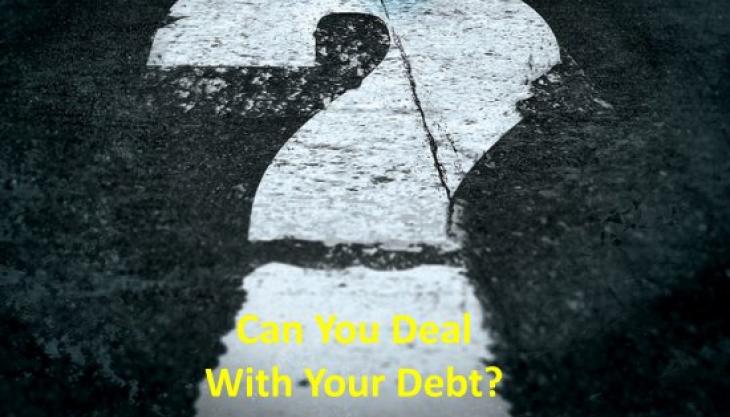When Is Bankruptcy Better Than Trying to Pay Off Your Bills? Tips for North Carolina Consumers
Submitted by Rachel R on Fri, 01/15/2016 - 9:05am

Is your debt out of control? Can you really afford it?
Image Source: Flickr User Milos Milosevic
“Bankruptcy” is a word that can put people off and that scares many consumers. Admittedly, bankruptcy is not something to jump into and is not an option to take lightly, but it may be the best thing for your financial future. How can you know if bankruptcy is better than churning on with your debt? Here are some factors for North Carolina consumers to consider.
Can you afford to repay what you owe?
The simplest answer to when bankruptcy is preferable to struggling with debt is when you can’t pay what you owe. But this is a gray area – what does “afford” mean? Could you afford your debt if you cut back on non-necessities shopping, ate out less, and skipped your summer vacation? If the answer to this scenario is yes, then you likely can afford to pay your debt and should. A short-term reduction in your lifestyle to get out of debt is a trade worth making.
However if you can only afford your debt if you skip doctor appointments, don’t get medicines you need, live paycheck to paycheck, and your family is doing without necessities because of debt, then you truly may be unable to afford to service your debt. If you can’t get out of debt without pushing yourself into a hardship situation, then you may want to consider a debt-relief option that’s more sweeping and immediate – like bankruptcy.
Income is not necessarily the determining factor
No matter how much you earn, you could be in over your head with debt. If your debt payments are impossible to manage on your salary no matter what you’re earning, you may not be able to conquer your debt without an intervention. For Chapter 7 bankruptcy, the most intense form of debt relief, there is a Means Test, but that doesn’t have to be a disqualifier.
Having a lower income means you may not be subject to the Means Test, but higher income is not a disqualifier either. So long as your debt far outweighs your income and assets, you may qualify for Chapter 7 which can wipe out your credit card debt, medical bills, and some past-due taxes. Don’t assume that you can’t qualify for Chapter 7 because of your income. In contrast, Chapter 13 bankruptcy helps you catch up on past due balances – but you can earn too little to qualify for this option.
Don’t live with unmanageable debt
If debt is ruining your life – if you have no breathing room in your budget, can’t save money or contribute to your retirement fund, are charging necessities on your credit cards, dodging debt collectors and don’t have any quality of life because of your debt issues, you need help. For some North Carolina consumers, it’s a matter of developing a stricter budget and tackling the debt strategically. But for others, no amount of budgeting will solve their debt problems.
If this is your circumstance, you may need to consider a more serious debt intervention like Chapter 7 or Chapter 13 bankruptcy. But you don’t need to decide alone. Speak to a reputable bankruptcy attorney about your debt circumstances. Bring in your income documents, debt information, and be completely honest in the consultation about your debts, budget, and spending habits. They need all the relevant information to make the best recommendation – and a bankruptcy attorney will not judge you.
You may be in denial about your debt and may not want to come clean to friends or family about what you owe, but a bankruptcy consultation is the place to come clean about all of it. An attorney can’t give you the best advice without all the information. Plus, an initial bankruptcy consultation should be free, so you don’t have to worry about getting more in debt to speak to a lawyer about getting out of debt.
In NC, contact the Law Offices of John T. Orcutt for a free North Carolina bankruptcy consultation. Call +1-833-627-0115 now for a free appointment at one of our convenient locations in Raleigh, Durham, Fayetteville, Wilson, Greensboro or Wilmington.
Debts Hurt! Got debt? Need help? Get started below!
Serving All of North Carolina
- Bankruptcy Attorneys Raleigh NC (North)
- Bankruptcy Attorney Fayetteville NC
- Bankruptcy Attorney Durham NC
- Bankruptcy Attorneys Wilson NC
- Bankruptcy Attorneys Greensboro NC
- Bankruptcy Attorneys Southport NC
- Bankruptcy Attorneys Wilmington NC
Bankruptcy Attorneys Raleigh NC (North)
6616 Six Forks Rd #203 Raleigh, NC 27615 North Carolina
Tel: (919) 847-9750

Bankruptcy Attorney Fayetteville NC
2711 Breezewood Ave Fayetteville, NC 28303 North Carolina
Tel: (910) 323-2972

Bankruptcy Attorney Durham NC
1738 Hillandale Rd Suite D Durham, NC 27705 North Carolina
Tel: (919) 286-1695


Bankruptcy Attorneys Greensboro NC
2100 W Cornwallis Dr. STE O Greensboro, NC 27408 North Carolina
Tel: (336) 542-5993

Bankruptcy Attorneys Southport NC
116 N Howe St. Suite A Southport, NC 28461 North Carolina
Tel: (910) 218-8682

Bankruptcy Attorneys Wilmington NC
116 N. Howe Street, Suite A Southport, NC 28461 North Carolina
Tel: (910) 447-2987
